Militants Strike India, Pakistan Alike

At least 34 people were killed in separate terrorist attacks in India and Pakistan Wednesday.
In Delhi, India, militants placed a suitcase full of explosives outside the city's high court, where nearly 300 people were lined up for the day's proceedings.
The explosion left at least 11 people dead and more than 60 injured -- the blast broke windows in the court house offices and caused a panic on the streets.
Police have made initial sketches of two suspects, both men. One is presumed to be around 25-years-old, the other around 50. The Indian National Investigative Agency has opened an investigation into the attacks, while a Pakistan-based militant group has already claimed responsibility.
Harkat-ul-Jihad Islami e-mailed a statement to a number of Indian media outlets, claiming to be behind the bombing. HuJI, whose name means Islamic Struggle Movement, has been behind a range of attacks in the region, including the attempted assassinations of Pakistan's President Pervez Musharaff and Bangladeshi Prime Minister Sheikh Hasina.
“We own the responsibility for today's blasts at Delhi High Court, the email sent by HuJI said. Our demand is that Mohammed Afzal Guru's death sentence should be repealed immediately else we would target major High Courts and the Supreme Court of India.
Afzal Guru was convicted of conspiracy after the 2001 attack on the Indian Parliament building in New Delhi that left 12 people dead.
Separately, In the Pakistani city of Quetta on Wednesday, two suicide bombers attacked a gathering of state police officers. At least 23 people were killed and more than 50 injured.
Authorities suspect that the Quetta bombing was done in retaliation after the arrest of al-Qaeda militants on Monday.
Police and state officials are increasingly becoming the targets of such attacks in Pakistan, as well as places like Afghanistan and Iraq, where militants believe that foreign governments have too much control.
© Copyright IBTimes 2025. All rights reserved.





















